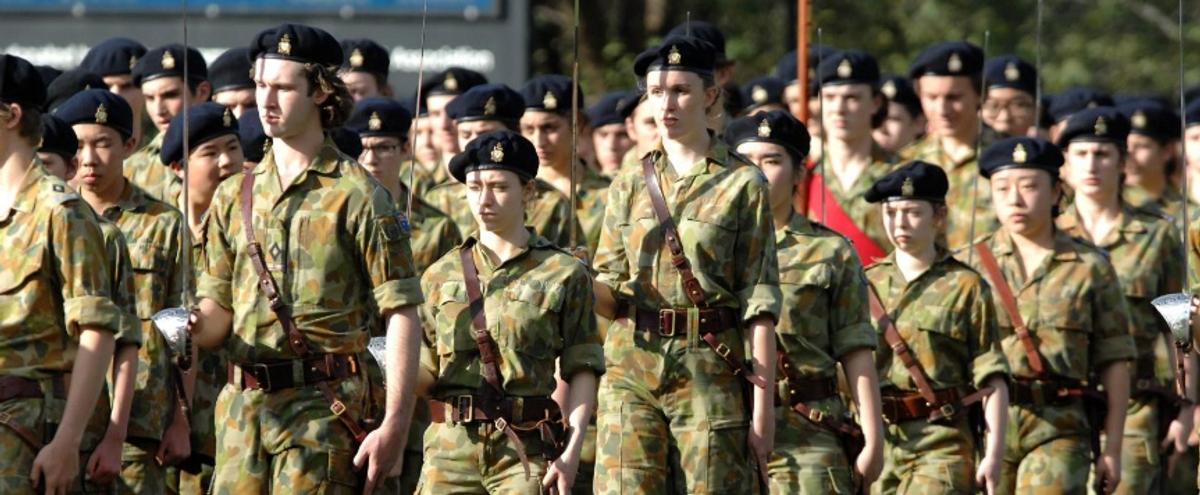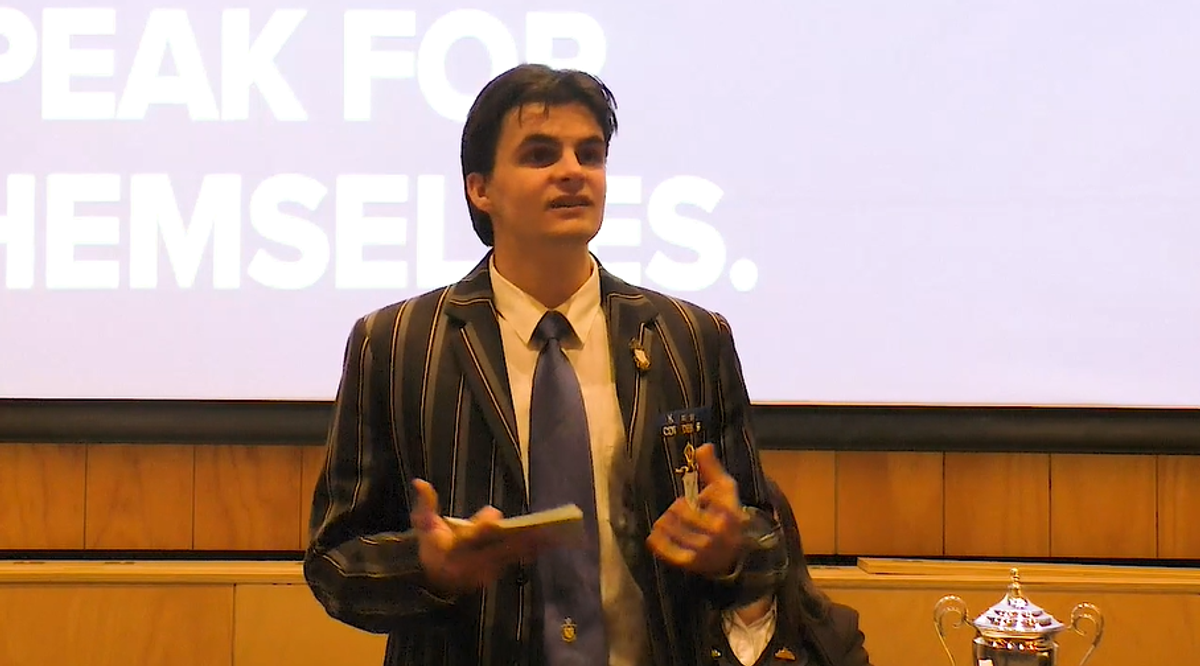Co-curricular Around the School

IGSACU Cadets
By Bethany Ryan, Year 10, The Ridgeway Campus
As the Promotional Courses for Cadets wrap up and we prepare for a new group of recruits next term, it’s time for a look back at the Unit’s origins and what makes it such a wonderful part of the Ivanhoe experience.
2021 marks the 60th Anniversary of the Ivanhoe Grammar School Australian Cadet Unit. There have been quite a few changes throughout the years, with the instatement of co-education at Ivanhoe letting female students participate, and of course a sizeable increase in numbers!
Boasting a strength of fewer than 20 cadets in 1961, the IGSACU has grown to be the largest Unit in Victoria. With over 600 participating cadets spanning across 4 year levels, the program has become an enduring staple of school culture.
In spite of tremendous unit expansion over 6 decades, there are several traditions which have remained firmly in place. The Cadet program’s two activity-based camps - the end-of-year Bivouac at Puckapunyal Australian Army facility and March ‘Annual Camp’ in Yackandandah – have rich histories, as well as the yearly Ceremonial Parade. Originally taking place in late October, the lengthy event became infamously known as the “Passing-Out Parade”. While a persisting downpour ensured that there was no fainting this year, the occasion continues to be a memorable event celebrating the year’s achievements.
As I write this from home during another bout of COVID-19 lockdowns, the Cadet calendar continues on unperturbed. Looking ahead to the start of a new Cadet season, the Unit is thrilled to welcome those Year 8 students who have selected the program! So, what can new members of such a proud and history-filled group expect in the next year? To give these students a proper run-down of the Cadet Unit, I’ve gotten some help from my friend and fellow Corporal, Jessica Hooker.
Upon joining the Unit, cadets are put into platoons where they will be taught by corporals, sergeants, and a CUO (usually Year 10s, 11s, and 12s respectively). As part of your platoon, you’ll learn a variety of skills including army drill, signals, radio operations, map reading, navigation, and medical knowledge, which will ultimately be put to use at the really enjoyable Cadet camps.
As well as these practical aspects, the close bonds cadets form with the members of their platoon, especially with those from other year levels, always proves a highlight. Jess states that meeting people she sees every day at school but doesn’t get the chance to know is a really worthwhile aspect of the program.
“Cadets provides a platform to form friendships with people from different year levels, something which I found especially valuable in my year at the recruit rank.” - Jessica Hooker, Year 10, The Ridgeway Campus
As well as being an immensely enjoyable opportunity to learn practical skills, the qualities instilled in Cadets participants are enormously beneficial. When asked about this, Jess cites responsibility, cooperation, leadership, and resilience as some of the values that the Cadet Unit brings out in students. Mei Gethen, a bonus interviewee and Cadets Corporal, mentions that teamwork is something that the Unit evokes extremely well.
“It also teaches you some discipline,” she says, “but not at the expense of fun!” - Mei Gethen, Year 10, The Ridgeway Campus
I have also been immensely privileged to take part in the Cadet program, participating as a recruit and cadet before being promoted to corporal rank last year and being part of the wonderful Ridgeway 8th Platoon. I hope to be promoted again this year and become a sergeant, so I can continue to contribute to the Unit and participate in something I thoroughly enjoy.
For those about to join the Cadet Unit at Ivanhoe, I sincerely hope you’ll enjoy one of the most unique and rewarding experiences the school has to offer. I promise you it’s worth it!
I’d like to thank Mr. Andrew Fox for kindly diving into the archives for old cadet photographs, as well as Ridgeway students Jessica Hooker and Mei Gethen for their generous interviews.
Our Future Politicians - Model United Nations
By Sasha Braybrooke, Year 11, Plenty Campus
Model United Nations, often referred to affectionately as 'M.U.N' by students, or better known as 'Model UN' is often portrayed as a riveting and dramatic experience in film and T.V. While as students of the real world, we often do not find ourselves using the same language shown in TV, instead opting for formal language to portray our thoughts, the drama and passion behind the event isn’t far from the truth.
This year on Tuesday the 3 August, Year 10 and Year 11 students from Ivanhoe Grammar School were given the chance to participate in Model United Nations, along with students from neighbouring schools. The event was the culmination of a couple months of work, in which students were assigned to teams and nations. Each nation represented by the teams was and is in fact, a member of the United Nations, and the states each had to consider their perspectives carefully.
Each year, Model United Nations follows a key global goal, and theme. The theme for this year was ‘Planet Ocean: Protecting the World’s Oceans, Seas and Marine Resources.’ and Ivanhoe Grammar School had the pleasure of hosting it. Although the event was initially to be held at the Plenty Campus in person, due to COVID-19 restrictions the event had to be held online. Despite this change, the teams still pushed forward resiliently.
The event required nations to consider not what they as individuals thought, but rather what their nation would believe on certain issues surrounding the theme, including but not limited to major trading partners, how each country was dealing with the effects of the pandemic, what seas each nation borders, marine biodiversity, and the nation’s reliance on seafood.
After careful consideration of factors such as their countries political stance, economy, trade and culture, teams put together a position statement for their nation, outlining their thoughts as a state on the Draft Resolution. The Draft Resolution contained clauses such as 2.8 which outlined the following: ‘Requests that Member States in the Spirit of Shared Responsibility and global solidarity, contribute 5% of their current COVID-19 Vaccine supplies to low income developing countries to ensure all nations can commit to addressing ocean conservation.’ Such clauses caused commotion and highlighted the differences of each nation, with each state outlining in their position statement what they thought of the clauses and their impacts on their nation, as well as the global community.
After listening to the position statements of all 30 nations, countries carefully considered which other nations they would like to align with, and the Caucus session began. In the Moderated Caucus, students were able to seek clarification from other nations, challenge other member states, or pose issues to the general assembly for discussion. Following the tension that the Moderated Caucus brought on, with many nations quickly realising their differences, the Unmoderated Caucus began. The Unmoderated Caucus was a more informal session where each nation was given the opportunity to speak with others and secure members to sign their agreement on proposed amendments to clauses in the draft resolution.
Amending clauses from the draft resolution involves changing words such as “Requests” to “Encourages” which although seemingly minor, plays a key role in the ability of the member states to assist with global issues. Some member states even had proposed to remove clauses entirely or proposed a new clause. Following much deliberation over such phrasing, the nations moved to the third session, Amendments to the Draft Resolution.
During this session, proposers of amendments are requested to stand up and provide reasoning for their amendments, along with seconder member states. After this, the secretary general opens up the floor for general debate, and member states vote “Yes” in favour of the amendment, “No” to disagree or can choose to “Abstain.” If the vote proves to be successful, then it is noted, and the next amendment is moved to.
In the fourth and final session, The Final Resolution Vote, delegates vote on the new Draft Resolution which contains the newly amended clauses. The delegates had to consider all aspects of the draft resolution and whether it aligns with the motives of their nation. In this year's Model United Nations, the new Draft Resolution passed successfully, and a new UN Resolution on the Topic of Ocean Conservation was created!
A reflection of events from a 'Russian Delegate' of the Model United Nations:
While initially quite daunting, my group found ourselves having a great deal of fun both while planning for MUN and conversing with other member states on the day. It was fascinating to learn about Russia’s involvement with global oceans, particularly as it pertains to social equality – a topic that frequently came up during the event.
Enriching conversations were held regarding developing nations, climate change and the impact of COVID-19 upon ocean conservation. I think fondly of the draft resolution discussions, as many delegates passionately and convincingly articulated their nation’s propositions for new UN legislation, which the General Assembly then voted on. Although no unanimous decisions were made, it was these deliberation caucuses that raised the most enjoyment of the day – not one to shy away from a debate, I found myself and my fellow Russian delegates frequently raising our hands to speak. - Ella Ray, Year 11, The Ridgeway Campus
The event overall successfully helps students to consider a variety of determinants and encourages global citizenship. Any students who are interested in the event should absolutely go for it, but be sure to research their state’s position, history, culture and key political factors which may play a role in their commitment to changes. Research and a deep understanding of your nation is what ensures a successful, dramatic and realistic Model United Nations!
Debating at Ridgeway
By Quang-Dinh Do, Year 10, The Ridgeway Campus
The season of debating started in March this year, just after getting out of lockdown. There were four teams for year 10, with around five to seven members per team.
The very first topic was “Alcohol should be subjected to plain packaging laws” and my team, Ivanhoe 3, was negative. This season, Alumnus Josh Phillips was a student coach for Year 10 Debating, who guided us through things such as forming a model, how to rebut an opponent’s argument, and the process of formulating our own strong and cohesive arguments. A great tip that Josh gave was to control the grey zone of the debate, the vague arguments in the middle of both teams which could be pulled to either side with enough conviction and persuasiveness. Doing so would result in winning the debate. On the night of March the 18th, most of the C level grade debates were won by Ivanhoe Grammar, including my own, Ivanhoe Grammar 3. Consisting of Melina Nikas, Samira Scala and myself, we prepared for our first C level grade a week in advance, to both get back into the flow of debating after the season was cancelled last year and to take on Josh’s advice. With this, we won the debate by one point, a great start to the season.
The second topic was “National service should be mandatory in Australia”. Ivanhoe Team 3, Isabel Smith, Ella Vertigan and Tansy Elliot won the debate as the affirmative side; with Tansy being awarded best speaker.
While each team knew the exact topic beforehand for the first two debates, the third debate was quite different, being an advised secret topic round. In this round, each team was given the clue that the topic would be related to education, however, the exact topic was unknown.
On the night, each team would turn up at the venue to receive the topic, and in that hour, would formulate models, arguments, rebuttals and team splits. Being a secret topic, each team was allowed to bring in non-electronic resources such as newspapers, books or printed notes into the planning room.
Leading up to it, the meeting sessions were dedicated to covering different potential topics, such as “Standardized testing should be abolished” and “School detention should be abolished.’’
On the night, everyone in Ivanhoe Team 3 had arrived by 5:45 pm, ready to be in the planning room by 6:00 pm, which was when the topic was released. “Private schools should be abolished”. It definitely shocked us, and probably the opposition team, Alphington Grammar, another private school. It was worse that we were affirmative, forcing us to self-deprecate our education system.
During the hour from 6 to 7, the team along with researchers Vangelis Matheou and Samira Scala came up with arguments. Since we were the affirmative team, we had the role of defining the model. We stated that private schools were schools which operated outside of government control, including religious schools, would be converted into public schools. Doing so would equalize education across Australia as government spending is spread equally across all schools. I was the first speaker, presenting my team’s model and our arguments on social equality and educational equality. Tansy spoke second and Isabel summed up our team’s arguments while rebutting the other team. The debate was close, but we won.
The fourth and most recent round was a secret topic round, meaning that the topic was completely unknown prior to the planning time. Due to the lockdown, the debate was held online on Zoom, meaning that google was made available as a research tool. This helped to improve the quality of the debate with stronger statistics for arguments.
For this round, Tansy, Isabel and Samira debated for the negative side, with the topic “Gambling ads should be banned”. Although Ivanhoe Grammar Team 3 debated very well, Ivanhoe Girls won the debate. We were all quite frustrated, as our team genuinely should’ve won, with better arguments and a stronger delivery compared to the other team. This ended our win streak of three, and unfortunately our chances of going into the finals. Nevertheless, it was a solid debate to end the season.
Even though the lockdowns caused much inconvenience by postponing the debates and making the last round online, the experience was still fun and enjoyable. This season of debating has helped me improve skills such as logical reasoning, planning, time management, and public speaking.
Everyone should try it at least once in their years at Ivanhoe Grammar. You’re guaranteed to gain something from debating, such as the chance to meet new people, practise for writing English orals, or skills to better argue with your family and friends.
What is Philosophy?
By Avlene Das, Year 8, Plenty Campus
Learning philosophy ends up feeling different from learning just another subject, but instead, it is able to give you a whole new viewpoint on day to day life and our current world problems.
Philosophy can be on the reality of knowledge and physical being or on the other hand, something within the mind. It can be thinking about if generalised morality is really correct, such as if the laws put in place have a reason to be followed further than the fact that you follow them only because you must.
First, thinking about the reality of anything at all, in the field of metaphysics, you begin to contemplate whether or not everything that you can see, everything you can feel, is as real as you believe it to be. Really, it could be said that everything you see is just an image you were convinced into believing. On the same path into epistemology, how can we be completely sure that everything that we claim to know is really complete knowledge? Sure, people would easily say that there is science, research, study, all this evidence to back up a thought, but as far as we can really know we might as well be a part of a computer simulator, and we would never know the difference.
Even just by this, we can work past the stereotype of philosophy as just being “why am I here?”. Think about it. Every decision that you make is based on your own philosophy. When choosing something, you would choose the “better option”. But what is the better option? Of course, it easily changes by the person and their preferred philosophical theories. Decision making is a key part of ethics and even if it is something small, even choosing something simple like what to eat for lunch, involves what you think you would enjoy the most, maximising your own happiness - an ethical theory.
In all, philosophy is able to, if not change, give a possibility at another take on every choice you make and everything that is happening around you.










